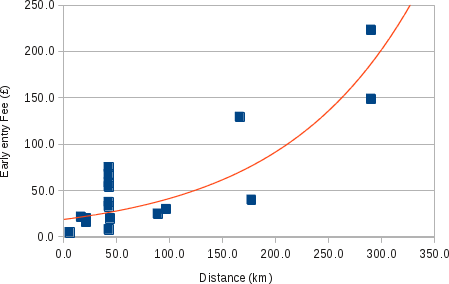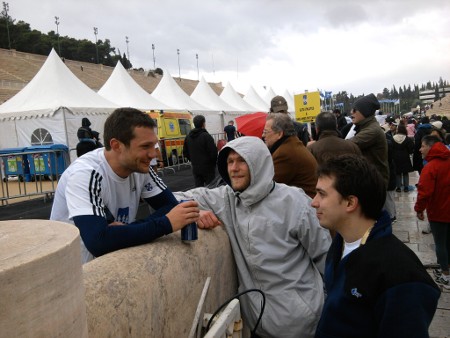By Julien on Tuesday, March 27 2012, 22:21 - Hardmoors
The week-end before last, I was off to North Yorkshire again for the third edition of the
Hardmoors 55.
As I arrived in Guisborough on Friday night, I went for a now ritual pre-race fish and chips. I ordered a "cod and chips and a coke", but my mumbling meant I ended up with a "cod and chips and a cod",
ie. two cods and a bag of chips. Probably in the order of 1200-1500 KCal in a meal. Not too bad before an ultra, but technically just enough calories for a half-marathon.
The Fox Inn was actually being refurbished as I stayed there. The hotel rooms were open as usual, but the pub downstairs was closed. This meant that unlike the
past two years, there was no disco night until 2am, and I could sleep a bit better!
An early coach took us to Helmsley, where the start was given by race director of the day Martin Dietrich at 9am. The runner field had increased again this year with 138 runners registered, served by a lot more volunteers.
As planned by the forecast, it started raining lightly an hour after the start. Nothing too serious, but enough to require a jacket and make the ground a bit slippery. At that point, I wished I had chosen the Inov-8 Flyroc rather than the Salomon XA Pro 3D Ultra, as the latter are a bit light on the grip when it comes to mud.
Things went smoothly until Osmotherley nevertheless.
I didn't feel too powerful for the most of the race, and most particularly in the uphill sections between Osmotherley and Bloworth Crossing. I was hoping for better after my double portion of fish. Maybe I'm not eating enough during the races. I need to figure that out.
Or maybe, as usual, I'm not training enough...
As I was approaching the remote and exposed checkpoint of Bloworth Crossing, some more serious rain started and did not stop until I left Kildale. I can't say it was the most pleasant experience, but when well equipped, I find it somewhat inspiring to battle the elements in the relative cosiness of a waterproof jacket.
Just like last year, I started to play the yoyo with Andy C. from that point.
Past Kildale, Captain Cook monument, Roseberry Topping, and High Cliff Nab (lit by two powerful lanterns this year, making it a beacon visible from Roseberry Topping), the path becomes wider and more runnable again, and I left Andy C. slightly behind. I caught up with a runner who had overtaken us before the previous checkpoint as he took a wrong turn. The exact same I took 2 years ago and got lost. I shouted in his direction, and it was his turn to chase me again.
Once on the disused railway line,
I felt a bit playful and decided to switch off my head torch, so that my chaser could not see me any more and might give up trying to reel me up. I knew the path was flat and mostly straight, so it felt OK to run in the dark. I just switched it on briefly a couple of times when approaching gates and other large obstacles. And indeed, my chaser's light rapidly disappeared... I kept pushing and looking back from time to time nevertheless. And suddenly, surprise, his light not that far off behind me! Just about to pass the gate I left behind a minute ago. How could he catch up so suddenly? Answer a few moments later as I turned around to judge his progress... but could not see him! I had been beaten at my own game, he too had clearly switched off his torch a while back. And since he was behind he could spot me effortlessly every time I switched mine on to pass a gate, whereas I only had been lucky to look behind as he was passing one.
I eventually finished in 11:16:36, a tad slower than last years, but fairly consistent otherwise!
| Checkpoint | 2010 | 2011 | 2012 |
|---|
| Osmotherley | 03:44 | 03:40 | 03:45 |
| Kildale | 08:21 | 08:20 | 08:25 |
| Guisborough | 11:14 | 11:10 | 11:16 |
Ultra training not required...


